Explantation: What happens when breast implants are removed?
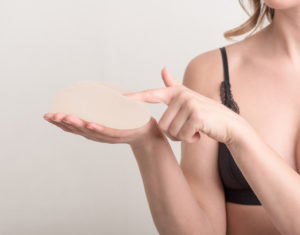 Breast augmentation is an incredible procedure, and results are usually fantastic! However, breast implants are not for everyone. I occasionally see patients who no longer wish to have their breast implants and are requesting removal. Is a “boob job” reversible?
Breast augmentation is an incredible procedure, and results are usually fantastic! However, breast implants are not for everyone. I occasionally see patients who no longer wish to have their breast implants and are requesting removal. Is a “boob job” reversible?
Explantation, as it is called, is a simple procedure that can be done in the office under local anesthesia. This procedure involves an injection of numbing medication into the area surrounding the scar that the implant was inserted through, reopening the past incision and pulling the implant out. If the scar quality is poor or stretched, the entire scar can be excised and a new scar created in its place for a more aesthetic result.
The inframammary incision is most commonly used and is the favored incision; however, other incisions are possible to re-use such as the periareolar scar (around the bottom of the areola) or the axillary incision (although this often requires muscle relaxation and a trip to the operating room). Although we try to avoid making a new incision where there is not already one present, the inframammary incision affords the best visibility and easiest recovery without risking infection or nipple sensation changes or severing milk ducts to the nipple, which preserves future ability to breast feed.
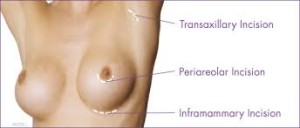
I am usually asked “What will my breasts look like after my implants are removed?”. Thoughts most patients have include fears of stretched-out skin or deformity, particularly if their implants are very large or if their implants have been in for many years. Before and after photos of explantation surgery can be seen here.
I reassure patients that just like pregnancy where the abdominal skin is stretched out magnitudes of times beyond what we thought was possible, particularly after the first pregnancy, the abdominal wall tends to bounce back to its original form.
After explantation, the breast usually returns to its pre-augmentation condition, including size and shape. If the patient has gained weight since her first surgery, the final breast volume may be slightly fuller than her pre-surgery state. See below for an example:
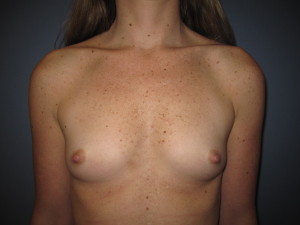
Before breast augmentation

8 years after breast augmentation with mild capsular contracture and asymmetry. The patient wished to have her implants removed as “they’re just not who I am now”.
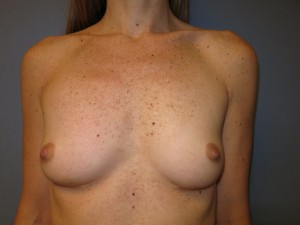
2 weeks after explantation, which was done in the office under local anesthesia. The patient is around 10 pounds heavier than before surgery and her breasts are proportionally a little fuller than before, but the natural shape has returned.
Here is another view of the same patient before surgery, after augmentation with capsular contracture, and 2 weeks after explantation:
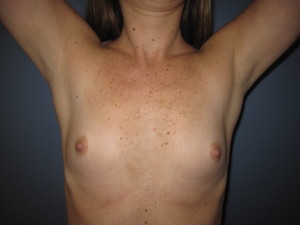
Before breast augmentation, hands above head (this view brings out most asymmetries and really shows the difference between the two breasts!).

Post-augmentation with bilateral capsular contracture, worse on the right than the left. Although it was not painful, this patient decided she wanted to have her implants removed. Note that the inframammary scars have faded so they are not visible.
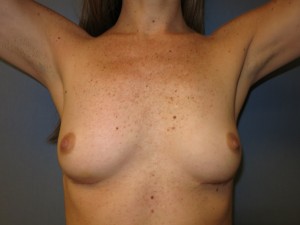
2 weeks following explantation. Incisions in the inframammary area (same incision) are expectedly pink and fresh. The breast shape has resumed its pre-augmentation state. The patient has gained around 10 pounds over the last 8 years, which is reflected in a slightly fuller breast volume naturally.
The recovery after explantation is around 1-2 weeks. I recommend taking at least a day or two off work, or working from home due to mild incisional pain for which an oral pain medication like Vicodin or Tylenol with Codeine is usually sufficient. Exercise can resume in around 2 weeks.
 It is NOT necessary to remove the scar capsule around the implant in most cases. Even if there is capsular contracture, the thickness of scar will lessen and any deformity related to capsular contracture will lessen when the implants are removed.
It is NOT necessary to remove the scar capsule around the implant in most cases. Even if there is capsular contracture, the thickness of scar will lessen and any deformity related to capsular contracture will lessen when the implants are removed.
The main message I give patients who are considering breast augmentation is that most things are reversible after breast implant placement. As long as you have a reasonably sized implant placed (i.e. within the regular range of breast implant sizing which is up to 800 cc), the skin and breast tissue should bounce back over a period of weeks to months.
For women with relatively perky breasts and a good nipple position, I discuss the option of a secondary breast lift as a worst-case scenario after a period of 4-6 months to allow to maximal skin and breast tissue contraction. This is not usually required.
A breast lift later on would require a trip to the operating room and 3-6 weeks of downtime, and it is thankfully not usually necessary. Some women with a significant amount of droop know that they want a breast lift, and sometimes a combined explantation and lift is planned. Learn more about breast lift (mastopexy) here.
To learn more about removal of your breast implants and for an evaluation in the office, call us at 415-923-3067 or complete our online consultation request form today!
